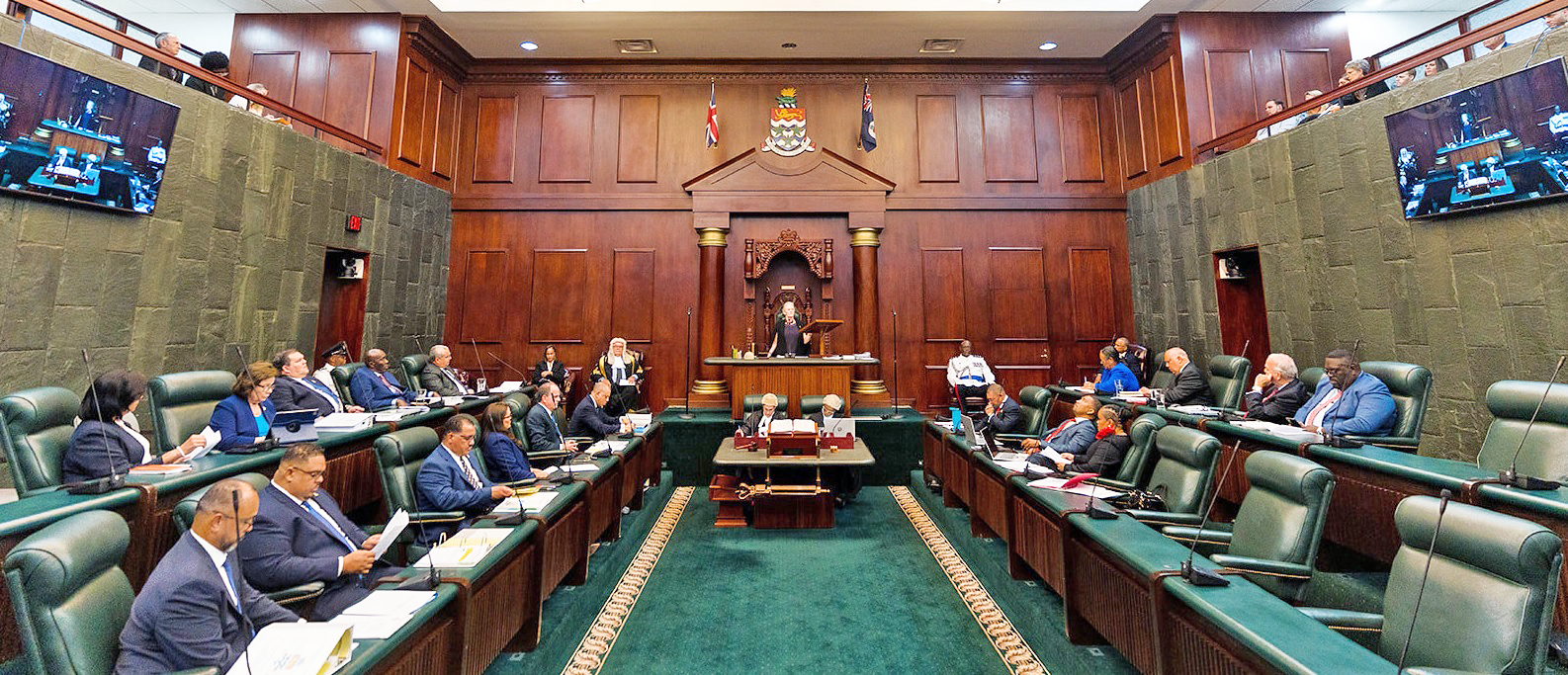By James Whittaker
Copyright caymancompass

Many of Cayman’s elected MPs have business interests or second jobs spanning almost every sector of the islands’ economy, according to transparency records reviewed by the Cayman Compass.
From stakes in construction, security and telecoms firms to rental apartments and Caribbean Utilities Company shares, the 19 members of Parliament declared a wide range of business interests to the Commission for Standards in Public Life.
The declarations are designed to ensure transparency over potential conflicts of interest when parliamentarians meet to discuss the business of the country.
But the register itself is not easily available to the public. To view it, a person must make an appointment and take handwritten notes from forms submitted by the MPs on an annual basis. Some are computerised but others are found in a binder of handwritten files. Anyone viewing the register is not permitted to carry a phone or to make copies.
The MPs also appear to have different understandings of their legal declaration requirements. Some declare everything from the amount they have left to pay on their private mortgage to their spouse’s monthly salary. Others include far less detail, in keeping with the minimum requirements of the law.
The recent announcement that Kenneth Bryan, a former tourism minister and now deputy leader of the opposition, was taking his real estate licence reignited an ongoing debate about MPs with second jobs and how they divide their time and loyalties.
Bryan has characterised his decision as a move that will allow him to do some part-time work to help his wife in her role as a real estate agent and to bring in some extra income.
He insisted it would not be a major time commitment.
“I am a full-time MP. I believe there are others that treat it as a part-time role but my people know they can get hold of me any time,” he said.
Bottled water, chicken dinners and clean gas
It should be noted that MPs on all sides have jobs and business interests. Home Affairs Minister Nickolas DaCosta has a business that supplies bottled water on Cayman Brac. Opposition Leader Joey Hew is a shareholder in a family restaurant.
Former Premier Wayne Panton is a shareholder in broadband provider C3 and Clean Gas – two major local businesses. Tourism Minister Gary Rutty owns more than 20 properties, as well as stakes in a restaurant. Immigration Minister Michael Myles’ family owns a vocational training centre and he has shares in Pickleball Cayman.
Opposition legislators Dwayne Seymour and Pearlina McGaw-Lumsden have stakes in security firms. Planning and Infrastructure Minister Jay Ebanks has an apartment that he rents through the Department of Financial Assistance.
There’s nothing in law that prevents this. In fact, many current and former MPs consulted for this article said it was inevitable and important that those in office have a wide range of experience and expertise. Issues can arise, however, when there is a perception of a conflict of interest.
The legal requirements
In the Cayman Islands, MPs’ conduct is guided by two frameworks working in tandem.
The Standards in Public Life Act requires annual and updated declarations of income, assets, loans, gifts and substantial interests (including relevant family interests), ensuring transparency on paper.
The Standing Orders that govern behaviour in the House of Parliament itself oblige members to disclose interests before speaking, recuse themselves where they hold a financial interest and abstain from voting on matters involving a direct pecuniary interest.
However, the oversight measures are not especially robust. If an MP votes on a matter despite having a pecuniary interest, that can only be challenged through an immediate motion to disallow the vote. Sanctions for MPs that do not make full declarations, or debate and vote on an issue relevant to their listed interests, are also limited in the Cayman regime.
There is also room for doubt about the level of conflict of interest required to trigger the requirement to step back from the vote. The Standing Orders refers only to “direct pecuniary interests” – which leaves room for interpretation.
Commission for Standards in Public Life Chairman Woody Foster suggested the law may need to be tweaked for clarity and to encourage greater disclosure.
He acknowledged that there was a balance to be struck in a small community between respecting people’s right to privacy and the public’s right to know.
But, he said, the trend internationally was moving towards greater disclosure.
“We need to strengthen regulations to make it easier for people to do the right thing. Right now, there are areas where individuals have to make a judgement call on their own,” he added.
Premier André Ebanks said he had met with Foster to discuss potential changes.
“I understand the commission is considering additional amendments to its legal framework. Government looks forward to working with the commission on these amendments in due course,” Ebanks said.
He said all 19 MPs were required to follow the procedures that it has set.
He added, “The commission must be respected as an independent body in order to effectively do its job of supporting our democracy.”
MPs indicate support for transparency
The MPs that responded to our questions for this story accepted the fact that their public role came with a requirement for some of their personal financial information to be more broadly known.
DaCosta, a new MP following the last election, was nonetheless familiar with disclosure requirements having served on the Planning Appeals Tribunal and Water Authority board.
“In anything that you do, whether it’s a job or volunteer role, there’s always going to be the potential for real or perceived conflict,” he said.
“What’s important is that you’re a person of integrity and you recognise that from the outset, and in any instance that something related is being discussed, you remove yourself from those discussions, and, more importantly, remove yourself from the decisions.”
DaCosta’s work outside of Parliament includes a boutique consulting and procurement business that currently distributes bottled water to businesses and government agencies on Cayman Brac.
He also does some consulting for a family construction firm. He said he was happy for his interests to be “open and transparent”, and would support more open access to the records, provided it met with the requirements of data protection legislation.
Chris Saunders, the former finance minister, has no outside business interests or incomes.
He said he understood the need for some MPs – especially those on the opposition benches – to have second jobs, but feels there should be different rules for ministers. He said he had not had any outside financial interests when he was a minister in the PACT cabinet.
“I did not want any conflicts,” he said, “so I made that conscious decision to give up all business interests.”
Opposition MP Roy McTaggart, who listed an extensive portfolio of shareholdings, said the two that occasionally came up in debates were his shares in CUC and in Butterfield Bank.
He said he had previously abstained from a vote where his financial interest in CUC might have been seen as a perceived conflict.
The former opposition leader and one-time finance minister said he erred on the side of caution, but was aware of relatively few occasions when others had recused themselves from votes.
McTaggart said there was a fine line between public disclosure and invasion of privacy, and he was not initially comfortable with his financial affairs being on public display. But, as an accountant in his professional life, he said, he understood the need for vigilance.
On occasion, MPs have also faced questions about whether they properly disclosed their interests. For example, Savannah MP Heather Bodden was criticised for voting on a highway project that passed through land owned by her family’s company, while former Premier Wayne Panton came under scrutiny for a private loan to a colleague that was not recorded in his declaration.
Both defended their actions, but the cases highlighted how much depends on interpretation – and how appearances of conflict can be as damaging as actual conflicts
Transparency a challenge across overseas territories
Cayman’s mixed record on transparency requirements is not unique across the British Overseas Territories.
A commission of inquiry in the British Virgin Islands found that legislators had routinely failed to declare their financial interests as required by law.
The territory has since created a public registry, but the viewing restrictions are so onerous that the BVI Beacon declared it a “shameful fail”.
As in Cayman, the register is only available by appointment, but unlike Cayman, the taking of notes is not allowed and no publication of the information is permitted.
Even that limited degree of access represented a massive expansion on what existed before the inquiry, said Freeman Rogers, editor of the Beacon.
“They were consistently flouting the law and the only reason that changed at all is because of the commission of inquiry,” he said.
Peter Clegg, a professor of politics at the University of the West of England who has researched and written widely on the overseas territories, said the UK has a significantly stricter regime than any of its territories.
But he noted that Westminster has shown no inclination to force through change overseas, treating it instead as a domestic matter devolved to local parliaments. If there is to be reform, he said, it will have to come from the MPs themselves – perhaps under pressure from the media and civil society.
‘Make register fully public and introduce penalties’
Clegg suggested that the easiest step Cayman could take to demonstrate commitment to transparency would be to make the register freely available online.
It could also expand disclosure requirements to cover a wider range of financial relationships, including details such as the monetary value of shareholdings or ownerships. Beyond that, he said, the law in Cayman and other overseas territories – and, to a lesser but still significant extent, in the UK – lacks teeth.
He recommends the creation of an independent enforcement mechanism with powers and resources to investigate, backed by proper penalties, including suspensions from Parliament.
Clegg acknowledged that it is widely accepted that MPs can have second jobs and businesses.
The problem, he said, arises when the time commitment or financial interests attached to those roles conflict with or could potentially conflict with their primary function as representatives of the people.
‘Without trust, democracy falls apart’
Despite much stricter regulations in the UK, Clegg pointed out, there have still been controversies.
Several high-profile politicians in Britain have faced backlash over outside interests, from former Attorney General Sir Geoffrey Cox’s multimillion-pound legal work in the Caribbean to Prime Minister Keir Starmer’s donor-funded clothing and Reform leader Nigel Farage’s nearly £1 million in media earnings.
These cases fuelled public concern about whether MPs can balance private gain with parliamentary duties, and helped drive calls for tougher disclosure and enforcement.
The issue is not unique to the UK and its island territories. A 2020 European Parliament study found that, even across EU member states, conflict of interest rules often suffer from vague definitions, fragmented oversight and weak enforcement.
The report warned that disclosure alone does little to build public trust unless it is backed by independent monitoring and meaningful sanctions, recommending stronger ethics bodies and clearer standards to close the gap between rules on paper and practice.
Clegg argues that such reforms would strengthen public trust in Cayman and ultimately benefit the islands.
“If you don’t have transparency, if you don’t have accountability,” he said, “then you don’t have trust – and without trust, democracy starts to fall apart.”



